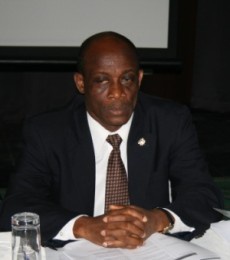
Ghana’s economic outlook points to “a stable and bright future,” Finance Minister Seth Terkper declared yesterday, calling on investors to take advantage of opportunities in various sectors by partnering government.
Speaking at the Ghana Economic Outlook and Business Strategy Conference in Accra -- attendees of which included investors from across the globe -- the Finance Minister said the country’s corporate tax ceiling of 25 percent is one of the most competitive investors could have.
The recent tax increases, the Minister said, are temporary and will be removed when the economic situation improves.
Although Ghana is viewed as being largely dependent on natural resources, Mr. Terkper said the services sector is actually the largest sector of the economy, adding that government is keen on having an even stronger services sector -- including strong banking and insurance industries.
He added that instead of government bearing the debt-burden of corporations like the Volta River Authority as has happened over the years, projects should be “self-financing” -- which calls for public-private partnerships.
“We expect to have more diversification, and we expect to have more value-addition.” Government, he assured, is mindful of and is working to address not just the volatility of commodity prices but also energy, among others.
Trade and Industry Minister Haruna Iddrisu said value-addition is the hallmark of the country’s future in terms of manufacturing, adding that the Mahama administration has earmarked the Western Region as the next industrial hub, aside from Tema, due to its many natural resource endowments.
He reiterated government’s intention to play the role of an enabler, creating the necessary business climate for the private sector to grow and create jobs.
To the visiting investors, the Minister said: “Ghana remains a place to do business. Do not ask the second question, ‘where to invest’. Invest in Ghana. We have established both the regulatory and legal regimes that protect your investment. The macro-economic environment has improved, infrastructure has improved. The
Ghana you knew in 1993 is not the same Ghana today. Apart from that, we have a stable political and social order. Ghana remains a safe and secure business destination in the West Africa sub-region, with enormous investment opportunities.”
The two Ministers’ comments echo sentiments expressed by President John Mahama when he met journalists at the Flagstaff House earlier this month to answer questions on governance and his management of the economy.
At that meeting, President Mahama defended tough measures -- including the removal of energy subsidies and tax hikes -- which have been taken by government to stabilise the fiscal situation following blown-out deficits in 2012 and 2013.
The President pledged more jobs through increased infrastructure investment as his government works to consolidate Ghana’s middle-income standing.